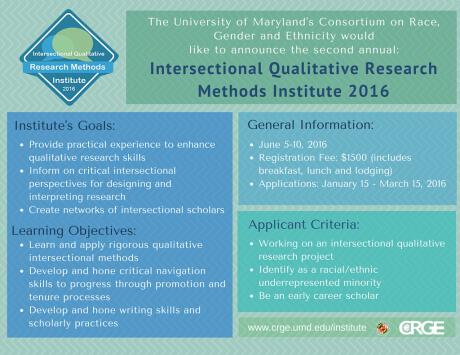Intersectional Qualitative Research Methods Institute 2016
The five-day Intersectional Qualitative Research Methods Institute (IQRMI) for Underrepresented Minority Scholars to be held June 5-10, 2016 is organized by the Consortium on Race, Gender and Ethnicity (CRGE). IQRMI is being supported by the New Connections Program, a national program of the Robert Wood Johnson Foundation, the Maryland Population Research Center, and the Office of Diversity and Inclusion at the University of Maryland, College Park.
Few training institutes focus on qualitative research methods and, currently, none incorporate discussions regarding the intersections of race, gender, class, ethnicity, and other dimensions of inequality (i.e., intersectional scholarship), especially as cultivated through the lens of underrepresented minority (URM) scholars. IQRMI brings together an interdisciplinary group of underrepresented minority scholars with common research interests and intersectional approaches to their scholarship. IQRMI is designed to enhance practical and theoretical skills and hone methodological skills to investigate important research questions within various disciplines.
As a leading research center that promotes intersectional scholarship through original research, CRGE is poised to serve as a mentoring venue for underrepresented minority early career scholars and can provide support in developing and submitting grants as well as submitting manuscripts in high impact journals.
IQRMI seeks applicants who identify as underrepresented minorities and early career scholars in qualitative scholarship. Underrepresented minorities include African Americans, Mexican Americans, Puerto Ricans, and Native Americans/American Indians: racial and ethnic groups who are part of the domestic talent pool and considered underrepresented due to their historical and contemporary exclusion in the academy relative to their proportion in the general U.S. population. Early career scholars include those who have earned their PhD degree within the last 10 years.
IQRMI participants will gain hands-on training using their own research projects. Projects are expected to contribute to the knowledge base of at least one of the following program areas:
- Advancing innovation in knowledge and practice in child welfare and juvenile justice systems
- Promoting economic, social, and educational opportunities for working families
- Creating community change for families
- Addressing health disparities and inequality
THE INSTITUTE’S GOALS
The 2016 Intersectional Qualitative Research Methods Institute
for Underrepresented Minority Scholars aims to:
- Provide practical experience in fine-tuning existing research designs and data analysis plans to enhance qualitative research skills.
- Inform on critical intersectional perspectives for designing and interpreting research.
- Create networks of intersectional scholars in order to promote grant-writing and publication through mentorship.
LEARNING OBJECTIVES
There are three main areas of focus for learning outcomes:
- Learn and apply rigorous qualitative intersectional methods.
- Participants will understand the components of qualitative research and its utility in developing empirical intersectional research projects.
- Participants will assess research questions and conditions that require the application of qualitative research methods.
- Participants will learn and apply data analysis skills using qualitative research technology and software (e.g. Atlas, NVivo, Dedoose).
- Develop and hone critical navigation skills to progress through promotion and tenure processes at U.S. institutions of higher education.
- Develop and/or improve writing skills and scholarly practices that enhance writing productivity among senior scholars and peers.




